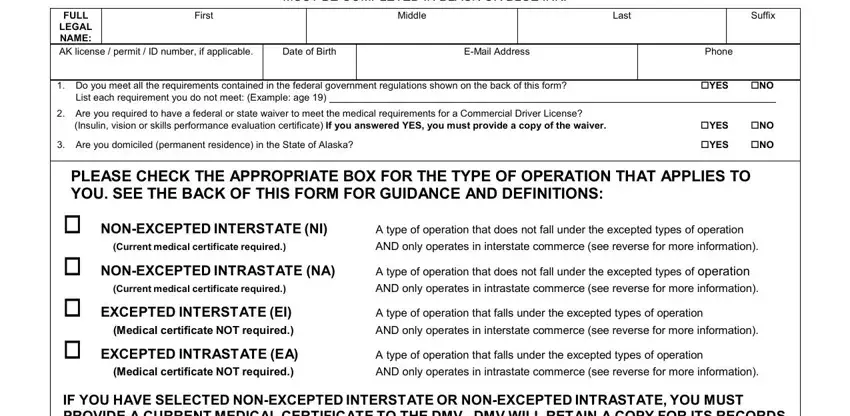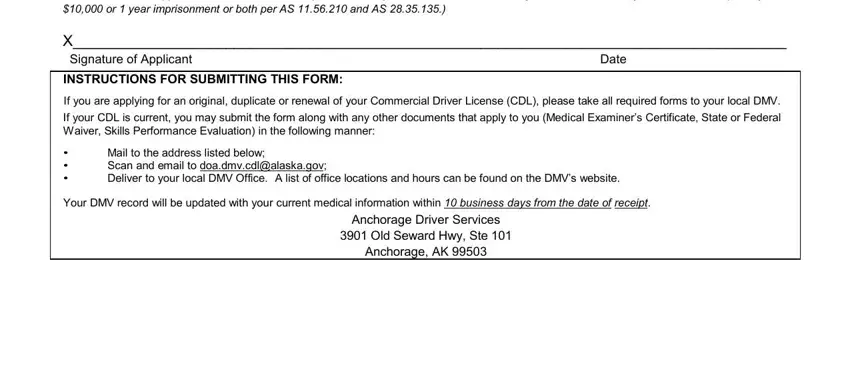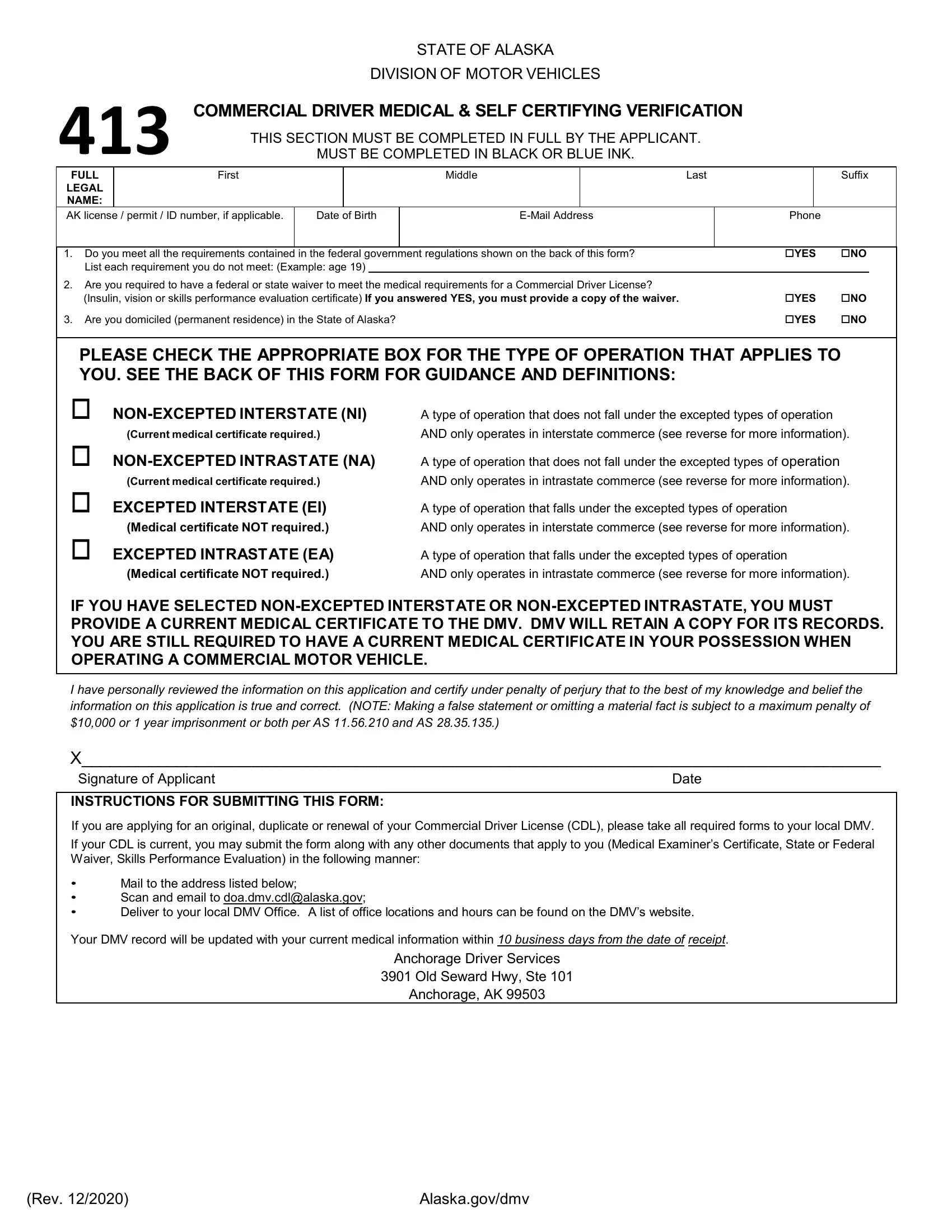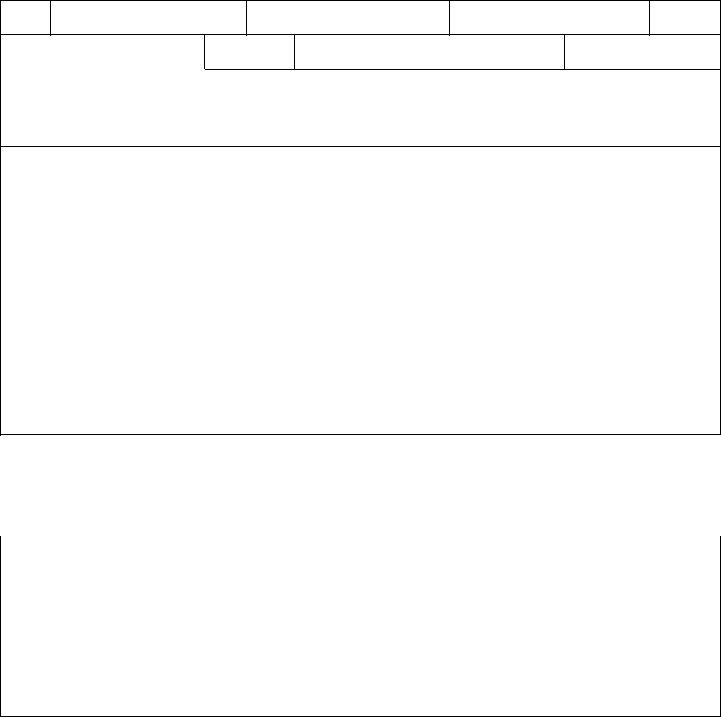CDL Medical & Self Certifying Verification Guide
SPECIAL NOTE: By selecting an INTRASTATE operation type, you are subject to the K restriction on your CDL. Only select INTRASTATE if you do not meet the Federal requirements for a CDL (under 21 or blind in one eye).
There are two differences between excepted and non-excepted types of operation. The excepted types of operation are defined in 49 CFR 390.3 (f).
If you operate a commercial motor vehicle (CMV) for any of the activities listed below a medical certificate is not required. You will need to self-certify to either excepted interstate or excepted intrastate.
• Custom Farm Operations
• Bee Keepers
• Federal, State, Municipal or Borough transportation and/or operation
• Occasional transport of personal property
If you operate a CMV outside of the excepted types of operation, you are considered non-excepted, and are required to have a valid medical examiners certificate.
If you have any questions regarding the self-certification types or the requirements, please contact Anchorage Driver Services at (907) 269-3770 or via Email at DOA.DMV.ADS@Alaska.gov for assistance prior to submitting the form.
DEFINITIONS
Domicile: "domicile" means the true and permanent home of a person from which the person has no present intention of moving and to which the person intends to return whenever the person is away.
INTERSTATE COMMERCE means trade, traffic, or transportation in the United States—
(1)Between a place in a State and a place outside of such State (including a place outside of the United States);
(2)Between two places in a State through another State or a place outside of the United States; or
(3)Between two places in a State as part of trade, traffic, or transportation originating or terminating outside the State or the United States.
Example: If the vehicle or load originates in one state and is transported to or through another state, the operation would be considered “interstate commerce”.
INTRASTATE COMMERCE means any trade, traffic, or transportation in any State which is not described in the term "interstate commerce”. Example: If the vehicle or load originates in one state and operator does not transport the vehicle or load outside of the original state, it is considered
“intrastate commerce”.
COMMERCE means (a) any trade, traffic or transportation within the jurisdiction of the United States between a place in a State and a place outside of such State, including a place outside of the United States and (b) trade, traffic, and transportation in the United States which affects any trade, traffic, and transportation described in paragraph (a) of this definition.
49 CFR 383.71 DRIVER APPLICATION AND CERTIFICATION PROCEDURES.
NON- EXCEPTED INTERSTATE. A person must certify that he or she operates or expects to operate in interstate commerce, is both subject to and meets the qualification requirements under 49 CFR part 391, and is required to obtain a medical examiner’s certificate by 391.45 of this chapter.
EXCEPTED INTERSTATE. A person must certify that he or she operates or expects to operate in interstate commerce, but engages exclusively in transportation or operations excepted under 49 CFR 390.3(f), 391.2, 391.68 or 398.3 from all parts of the qualification requirements of 49 CFR part 391, and is therefore not required to obtain a medical examiner’s certificate by 49 CFR 391.45 of this chapter.
NON-EXCEPTED INTRASTATE. A person must certify that he or she operates in intrastate commerce and therefore is subject to State driver qualification requirements.
EXCEPTED INTRASTATE. A person must certify that he or she operates in intrastate commerce, but engages exclusively in transportation or operations excepted from all or parts of the State driver qualification requirements.
49 CFR Part 391.11 GENERAL QUALIFICATIONS OF DRIVERS.
(a)A person shall not drive a commercial motor vehicle unless he/she is qualified to drive a commercial motor vehicle. Except as provided in 391.63, a motor carrier shall not require or permit a person to drive a commercial motor vehicle unless that person is qualified to drive a commercial motor vehicle.
(b)Except as provided in subpart G of this part, a person is qualified to drive a commercial motor vehicle if he/she –
(1)Is at least 21 years old;
(2)Can read and speak the English language sufficiently to converse with the general public, to understand highway traffic signs and signals in the English language, to respond to official inquiries, and to make entries on reports and records;
(3)Can, by reason of experience, training, or both, safely operate the type of commercial motor vehicle he/she drives;
(4)Is physically qualified to drive a commercial motor vehicle in accordance with subpart E -- Physical Qualifications and Examinations of this part;
(5)Has a currently valid commercial motor vehicle operator's license issued only by one State or jurisdiction;
(6)Has prepared and furnished the motor carrier that employs him/her with the list of violations or the certificate as required by 391.27.
(7)Is not disqualified to drive a commercial motor vehicle under the rules in 391.15; and
(8)Has successfully completed a driver's road test and has been issued a certificate of driver's road test in accordance with 391.31, or has presented an operator's license or a certificate of road test which the motor carrier that employs him/her has accepted as equivalent to a road test in accordance with 391.33.
REQUIRED TESTS
Both the Alaska and the CDL General Knowledge tests or equivalent are required to obtain a permit or license. You must pass the air brakes knowledge test or an “L” restriction will be added to the license or permit. You would be restricted to operating vehicles not equipped with air brakes. Class A and IA require the combination knowledge test.





